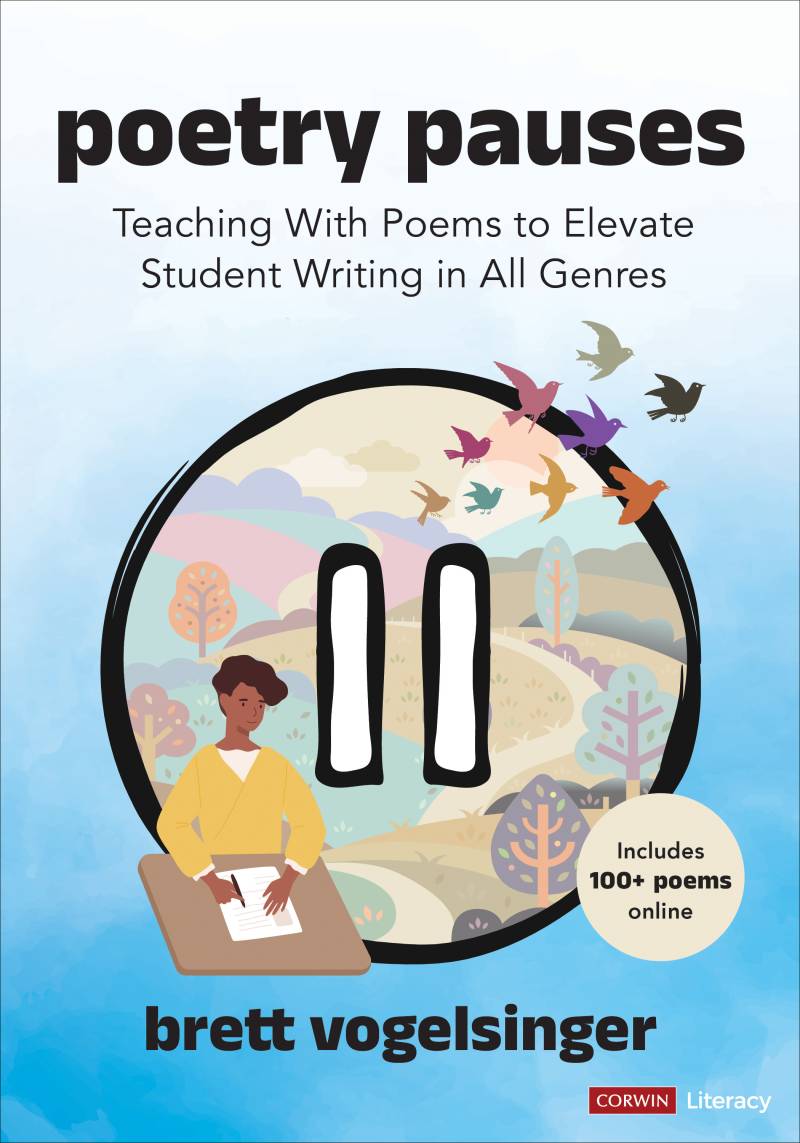I share that this poet was an abolitionist and a temperance and women’s suffrage activist, yet here she pauses to argue that the world needs music. This is a poem of hope, a poem that argues it is important to confront present suffering while also envisioning better things beyond it. It calls for making the music that will help usher in that brighter future. We can certainly read the word music figuratively here too: creating harmony, making noise, stirring the heart to action. This is a resonant argument even today.
While argument writing in its other forms — editorial, essay, comic, photojournalism or speech — must be grounded in fact and reason and 18th-century Enlightenment logos, the very best arguments, whatever form they take, also help us to feel deeply alongside the writer, to unsettle our complacency or open space for empathy. Poetry lets us bring a little bit of extra pathos, the more 19th-century notion of the “wild west wind” that Percy Shelley famously conjures. He begs of that wind, “Drive my dead thoughts over the universe/ Like wither’d leaves to quicken a new birth!” Argument, whether published as a poem or embedded as a bit of verse in the writer’s process for another genre, has kinetic energy. It drives away dead thoughts and clears a place for new ones.
Poetry Pause: Sharpening a Claim
My favorite classroom anecdote about the power of poetic claims begins with a bit of poetry from 13th-century Persian poet Rumi.
I needed a super short Poem of the Day to share so we could move along with a lengthier lesson, and I chose this little snippet of verse:
Raise your words
not your voice.
It’s rain that grows flowers,
not thunder.
Public domain.
My student, whom I will call Mike to preserve his privacy, angled his tall torso back in his chair and abruptly said, “Wow! I love that one!”
Mike was not a student known to do this. He was a caring friend to his peers with a reputation for being polite. He was also known for a casual attitude toward academic work and often viewed deadlines, even entire assignments, as optional. So his sudden engagement caught my interest even more when he said, “Can I write it down to keep?”
“Sure, Mike!” I said and carried on with our planned brief discussion about what the poet means and how the metaphor enhances that meaning.
A week later came the real shock. The door flew open, shaking our modular classroom a little bit, and Mike entered, just before the bell as the rest of the class was settling in. “I have to tell you something!” he announced, loud enough for everyone to hear. “I used a poem yesterday!”
“That’s great . . .” I said, half distracted with attendance-taking. “Have a seat and you can tell us about it.”
He began, “So my mom and dad were getting mad at each other about something last night, and they were starting to argue, you know getting louder and angrier. And that poem we did a few days ago popped in my head, about the rain and the thunder.”
Suddenly I felt my eyes widen just a little bit as I began to fast-forward. Uh oh! Where is this story going? Did he quote this poem to his parents mid-argument??? Because my first thought here is that this is a good way to get both parents to turn on a kid, right? I mean, who wants to hear Rumi when you’re fighting with your spouse?
“So I said to them,” he continued, “Mom, Dad: ‘Raise your words not your voice. It’s rain that grows flowers, not thunder.’ And it worked. They stopped and we all sort of talked about it.”
I paused, tentative. “About the poem?”
“Yeah! And how it means you get farther talking about things calmly like rain instead of loudly like thunder.”
I should stop here to say that I still think the more common outcome of quoting poetry to an angry parent would be far less positive, so this story will stick with me for my entire career. A succinct argument in verse written centuries ago had instantaneous relevance in a household dispute, and a 14-year-old knew it could. It presented an argument that stopped the other kind of argument, the more painful kind, in its tracks. Wow. Just, wow.
Of course, not all argument writing negotiates family peace. Some is meant to stir us up, to motivate readers, to poke at our conscience and provoke action. Willie Perdomo (2020) refers to the “lyrical machete” a poem can wield (p. 1). There is a sharpness to a good argument, an edge, a ferocity, a danger. And like a machete, it can open a new path through our viny, wild, confusing world. We want students to feel this as they craft argument pieces, but too often they end up recycling opinions they have already heard in words others have used to make the same point. They may shy away from taking a stand, sometimes because they lack a thorough understanding of a topic, sometimes because they lack a real passion for it, and sometimes because they want to avoid being divisive.
A simple poem like Rumi’s verse can provide a mentor for sharpening a claim into a few words and a single figurative image. Look at how the poem moves.
Line 1: Do this (Raise your words)
Line 2: Not this (not your voice).
Lines 3–4: Here’s a metaphor to make that point visual (It’s rain that grows flowers,/ not thunder).
This format could be used to write about any topic. Instead of just using this particular poem when I need something quick, I now use it to help us sharpen our claims.
“So think about that format,” I tell my students. “Let’s see how this pattern could work for your topic. Tell someone what to do and what not to do. Maybe it’s replacing an old habit with a better one, like this poem. Maybe it’s choosing the tougher-but-better path instead of the easy-but-problematic one.”
I continue, “Then comes the trickier part. Can you make this visual with a metaphor? See how it’s that last twist that makes Rumi’s poem so memorable and enduring? If you disagree with his point at first, the imagery in that metaphor makes it clear . . . yeah, gentleness can coax good results, whereas loud thunder doesn’t really make anything grow or make anything better. It just thunders, making lots of noise. Try to imagine a quick, simple scenario that fits your topic and does the same.”
Once students have had a few minutes to give this a try, ask them to share in a group of four so that they hear three other variations on this model written around three other topics.
“Of course, this is not going to work directly as a claim for your essay,” I continue. “But there are some bits we can use here. The poem is short but potent and it gets its point across without muddying it up with lots of words. In fact, it states the main point in just a few words. Let’s see if we can do that with our claims.”
After students draft a claim to develop, we address the other part of the poem. “The second half is really just a metaphor. But metaphors work just as well in essays as they do in poems. Look at your metaphor. Would you see this as something you could use in the beginning of your essay to pique a reader’s appetite for your ideas? Or does it develop a point so well that it belongs in the heart of the essay to make some key evidence stand out? Or is this metaphor so close to your main point that it really needs to be in the last line or two, that final, memorable image to lock the point in your reader’s mind? Jot the idea for where this might go in your writer’s notebook. And remember, it’s OK to change your mind later.”
Writing a claim does not have to be intimidating, and it is not too early to consider what imagery or figurative language might complement that claim right from the outset of an argument writing project. Students may leave this activity with the sense that they have uncovered something clear and beautiful, which can give them energy for the work ahead: developing support for their claim.
 This view, however, inappropriately confines what poetry can do. … Argument embedded in poems is nothing new. Consider the work of 19th-century Black poet Frances Ellen Watkins Harper and her poem “Songs for the People”:
This view, however, inappropriately confines what poetry can do. … Argument embedded in poems is nothing new. Consider the work of 19th-century Black poet Frances Ellen Watkins Harper and her poem “Songs for the People”:


 Brett Vogelsinger has been teaching English for 20 years and currently teaches ninth-grade students at Holicong Middle School in Bucks County, PA. He is a regular contributor at the Moving Writers blog (www.movingwriters.org) and has written about teaching and learning for Edutopia, NCTE Verse, and The New York Times Learning Network. When not teaching, grading or writing about such things, you will likely find him spending time with his family, his garden or his Jenga tower of books he plans to read. You can find him on Twitter
Brett Vogelsinger has been teaching English for 20 years and currently teaches ninth-grade students at Holicong Middle School in Bucks County, PA. He is a regular contributor at the Moving Writers blog (www.movingwriters.org) and has written about teaching and learning for Edutopia, NCTE Verse, and The New York Times Learning Network. When not teaching, grading or writing about such things, you will likely find him spending time with his family, his garden or his Jenga tower of books he plans to read. You can find him on Twitter